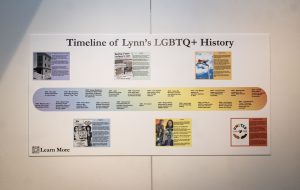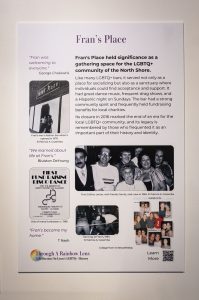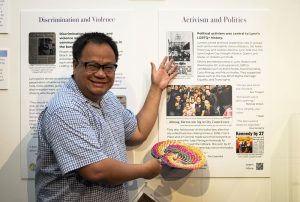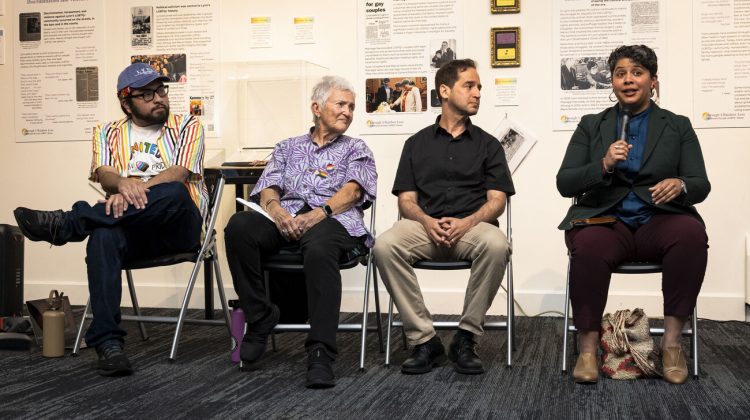LYNN — The community gathered at the Lynn Museum to mark the opening night of United Lynn Pride’s exhibit “Through a Rainbow Lens, A Reflection on Lynn’s LGBTQ+ History.”
The program dives into the city’s LGBTQ+ history through memorabilia, photographs, oral histories, and other items from longtime LGBTQ+ residents and other people who had an impact on the city’s LGBTQ+ culture.

Project Director Jim Moser welcomed everyone to the opening of the exhibit and said the night would celebrate the yearlong work it took to put everything together and the launch of the exhibit’s website.
“I think this year, it’s a time to reflect on our history and how far we’ve come,” Moser said. “We have marriage equality and a lot of acceptance. But, there’s still a lot more work to be done, especially with trans acceptance, trans equality.”
The program was made possible due to a grant from Mass Humanities, with funding from the Barr Foundation.
Cristela Guerra, an arts and culture reporter for WBUR, served as the moderator for a panel discussion about the city’s LGBTQ+ history.
“To see (the exhibit), to see the light that’s continuing in Lynn; I mean, this is one of the gayest places I’ve ever lived,” Guerra said.

Guerra introduced the panel and brought Patricia A. Gozemba to the podium to speak.
Gozemba is an author and activist for environmental and LGBTQ+ rights. She wrote the article “In and Around the Lighthouse Working-Class Lesbian Bar Culture in the 1950s and 1960s” with Janet Kahn.
In her speech, Gozemba quoted author Judy Grahn, who talked about her experience coming out in the 1950s in her book “Another Mother Tongue.”
“Judy said, ‘We were frightened all the time. Yet still we found our world exciting and wouldn’t stop being gay for anything,’” Gozemba said.
At the time, Gozemba said, gay bars were the only public expression of gay culture in a “closeted world.”
“That was our culture. LGBTQ+ culture was the bars. There was no place where we could go into and know there were other LGBTQ+ people there,” Gozemba said.
Lynn does not have any gay bars currently, Gozemba said, as a lot of the community gathers together online and Fran’s Place, one of the first gay bars in Massachusetts, closed in 2016.
Gozemba said she did a bit of research at Fran’s Place when living in Lynn from 1973 to 1979 for the article she wrote.
“I enjoyed going there occasionally,” Gozemba said.
47 Central, another popular gay bar in the city, closed in 2015.
Dr. Andrew Darien, a professor in Salem State University’s history department, worked in collaboration with United Lynn Pride as the program’s humanities advisor, conducting oral histories.
So far, Dr. Darien has recorded the stories of 25 people who shared their experience being LGBTQ+ in Lynn.
As an oral historian, Dr. Darien said the most important things to consider when conducting interviews are trust, representativeness, and objectivity.
“People that come forward to us to offer the most personal and intimate details of their lives, we want to be clear from the very beginning that we will share their words with (honor). We wanted to make sure that we weren’t putting them in jeopardy and that they were comfortable with that prospect,” Dr. Darien said.
Dr. Darien said he is proud of the representation of the oral histories, having spoken to people across the “rainbow spectrum.”

“I think we did a reasonably good job. But, I would be naive if I said that all of these communities are equally represented,” Dr. Darien said.
He showed snippets of the interviews, allowing the audience to hear both positive and negative accounts of what it is like to be part of the city’s LGBTQ+ community.
“We tried to allow each narrator to paint their canvas as they understood it,” Dr. Darien said.
Dr. Darien said he is still looking to record five to 10 more oral-history accounts.
United Lynn Pride President and Executive Director Cristian Recinos, a lifelong resident of Lynn, said United Lynn Pride officially started only two years ago and is still in its early stages.
“I’m just very thankful and hope that the organization, while it’s very young, continues to be received well by the community,” Recinos said.
Being bilingual and knowing that Lynn is a city of many languages, Recinos said that the organization actively works to provide resources to non-English-speaking LGBTQ+ people in the community.
“I really think the diversity here in the city is one of our greatest strengths,” Recinos said.
“Through a Rainbow Lens” will be on display at the Lynn Museum until October. More information and the oral histories can be found at www.UnitedLynnPride.com/Through-A-Rainbow-Lens

